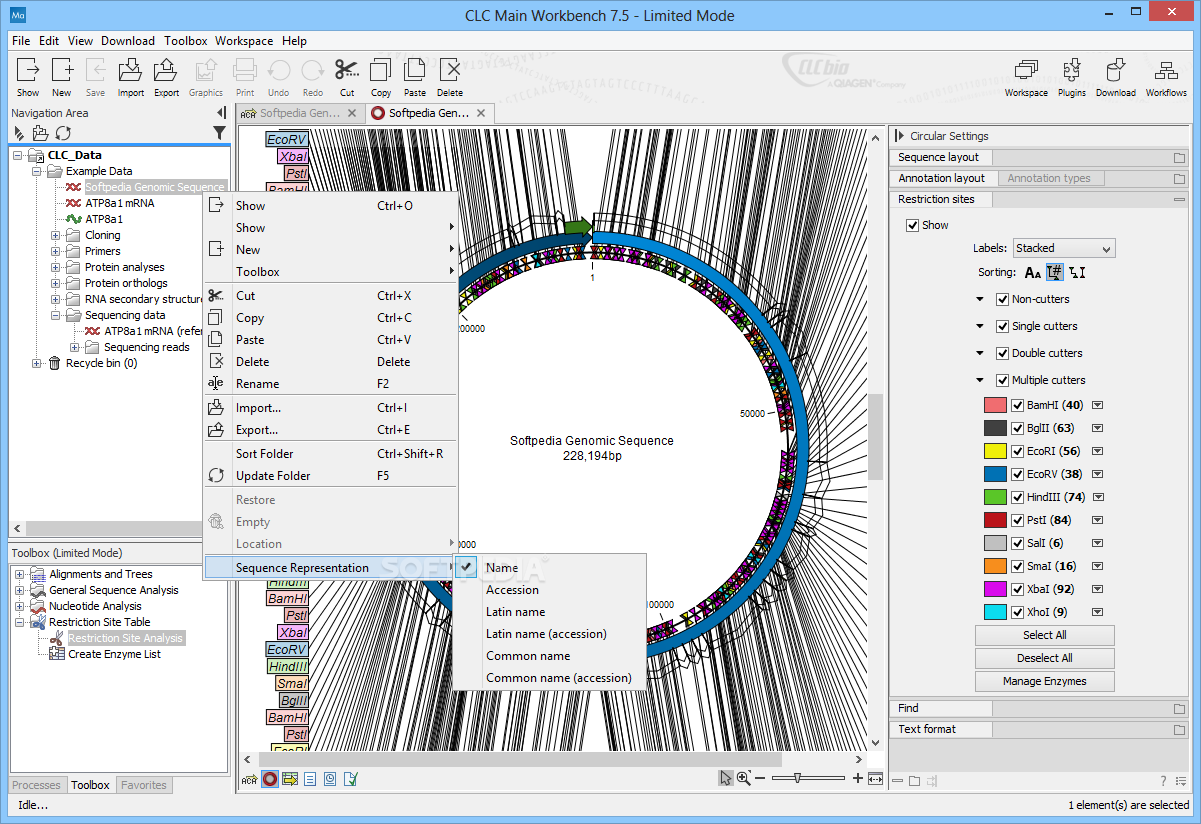Thank you for using our software portal. Use the link below and download CLC Main Workbench legally from the developer's site. We wish to warn you that since CLC Main Workbench files are downloaded from an external source, FDM Lib bears no responsibility for the safety of such downloads. We recommend checking your downloads with an antivirus. Download CLC Genomics Workbench (64-bit) for Windows to analyze next generation sequencing data. The general steps for setting up a CLC License Server are: 1.Install the software. 2.Configure the service. 3.Download license files. 4.Start the CLC License Server and check it is running as expected. 5.Optionally, customize the license server to suit local requirements. 6.Configure clients to connect to the CLC.
 CLC Genomics Workbench is a powerful solution that works for everyone, no matter the workflow.
CLC Genomics Workbench is a powerful solution that works for everyone, no matter the workflow. Utilizing cutting-edge technology, unique features and algorithms widely used by scientific leaders in industry and academia to overcome challenges associated with data analysis.
Utilizing cutting-edge technology, unique features and algorithms widely used by scientific leaders in industry and academia to overcome challenges associated with data analysis.User-friendly bioinformatics software solutions allow for comprehensive analysis of your NGS data, including whole genome and transcriptome de novo assembly, targeted resequencing analysis, variant calling, ChIP-seq and DNA methylation (bisulfite sequencing analysis).
Uncover critical correlations between microbiota, its metagenome, and host. Making sense of complex metagenomic data becomes easy through tools and streamlined analysis workflows for taxonomic and functional microbiome analysis.

Supported NGS platforms are Illumina, IonTorrent, PacBio and GeneReader.
RNA-seq and small RNA (miRNA, lncRNA) transcriptomics workflows for differential expression analysis at gene and transcript levels.
CLC Genomics Workbench supports the complete resequencing pipeline for detecting and comparing genetic variants. When dealing with high sample volumes efficient algorithms reduce run time while customizable analysis workflows and batch processing shorten hands-on time to a minimum.
CLC Genomics Workbench allows you to focus on the biological interpretation of detected variants.


The first step in resequencing is accurate read mapping. Our algorithm is optimized for high-quality mapping of large data volumes in a fast and memory-efficient way.
The algorithm offers comprehensive support for a variety of data formats, including both short and long reads, and all flavors of paired read data regardless of insert size or read orientation. It also supports the use of hybrid data sets. Local realignment can drastically reduce false positive detection rates for certain variant types. Our goal is to reduce your manual work and focus on deriving biological meaningful results from raw NGS reads.
The free “Advanced RNA-Seq plugin” integrates all the analysis steps – from secondary analysis of the reads to sophisticated statistics – into easy-to-use workflows, and gives access to a wide range of experimental designs, from case-control or multi-group experiments to multi-factorial experiments. All tools account for differences due to sequencing depth, removing the need to normalize input data. Multi-factorial statistics control for batch effects and support paired studies. Statistical results can be visualized in a genomic context as tracks, in a table view, or through the many visualization options leveraging metadata: volcano plots, 2D Heatmaps, Principal Component Analysis and Venn diagrams.
Clc Main Workbench Keygen Download Mediafire
Clc Main Workbench Keygen Download Windows 10
CLC Genomics Workbench offers a range of accurate variant detectors to detect single nucleotide variants (SNVs), multi-nucleotide variants (MNVs), small to medium sized insertions, deletions or replacements, as well as large structural variants. Algorithms for the sensitive detection of so called “low frequency” variants supported only by a small fraction of mapped reads complete the detection tools.To make sense of detected variants CLC Genomics Workbench offers a range of filter and comparison tools.